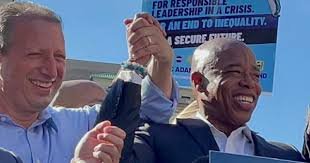Mayor Eric Adams, Comptroller Brad Lander release 5 key actions for better contract for New York

New York City Comptroller Brad Lander and senior members of the New York City Mayor’s Office have partnered to release the findings of “A Better Contract for New York: A Joint Task Force to Get Nonprofits Paid On Time.”
In a statement, both offices announced five actionable steps to better manage and streamline the nonprofit contracting and procurement process while increasing accountability and transparency.
The recommendations were the result of a joint task force first convened during the transition period to jump start solving long-standing issues in city governance that impact the delivery of services to New Yorkers.
“For too long, the City has relied on nonprofits to deliver essential services without holding up its end of the bargain,” said Mayor Eric Adams.
“The failure to pay our nonprofits in a timely manner has not only hurt our nonprofit sector, which is predominantly made up of Black and Brown workers, but also the New Yorkers who rely on their services. The findings from this task force will guide needed reforms to our contracting and procurement rules, improving transparency and accountability throughout all stages of the process.
“I thank Comptroller Lander for his partnership, the members of this task force, and the human services providers who perform life-saving work for New Yorkers who need it most every day,” he added.
“Our City’s nonprofit human service providers are lifelines for New Yorkers, providing essential services from feeding the elderly to mental health care, yet our City’s cumbersome contracting process has hindered many nonprofits’ abilities to deliver these critical services,” said Comptroller Brad Lander.
“With input from dozens of organizations and agency stakeholders, Mayor Adams and I put our heads together to substantially improve the process for the organizations New Yorkers rely on.
“Our mission was to ensure timely payments to responsible contractors so that organizations can continue to serve New Yorkers, while maintaining appropriate oversight to prevent abuses.
“I look forward to working with Mayor Adams, his future appointment to the newly created Mayor’s Office of Nonprofits, and our city’s essential non-profit organizations to implement these overdue reforms,” he added.
New York City contracts out many of its programs to nonprofits—from health and housing assistance, shelter operations to after-school activities. Last year, the City procured $12 billion in human services, totaling 40% of procured goods and services.
The nonprofit sector is a substantial part of the City’s economy, employing over 500,000 people, an overwhelming majority of whom are women and people of color.
Unfortunately, many of these partners wait months, and up to more than a year, to get paid for services they provide to New Yorkers. In FY22, over three-quarters of the City’s contracts with nonprofit organizations arrived at the Comptroller’s office for registration after the start date.
The primary recommendations for reforms included:
1. Accountability and Transparency: Create new systems that both hold city stakeholders accountable for timely procurement and contracting and increase transparency to nonprofit providers and the public, including creating Contract-stat– a public data dashboard similar to Compstat.
2. Streamline and Modernize: Reduce inefficiencies and delays in the procurement and contracting process with improved and expanded adoption of the PASSPort digital procurement system across agencies.
3. Fairness and Equality: Lower the burden incurred by smaller, primarily BIPOC-led nonprofits when contracting with the City, including increasing the Returnable Grant Fund and rewriting the standard human services contract to acknowledge cost escalations, like the cost of living adjustments, that would increase the original cost of these vital services contracts without the need for amendments.
4. Leadership and Management Practices: Establish leadership and management practices at the highest levels of city government, including the new Mayor’s Office of Nonprofits, with input from nonprofit organizations.
5. Capacity Building: Strengthen the capacity of nonprofit organizations’ administrative and contracting capabilities through training and technical assistance to support nonprofits.







